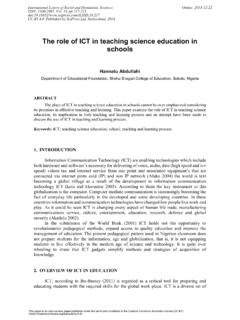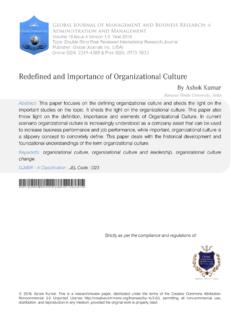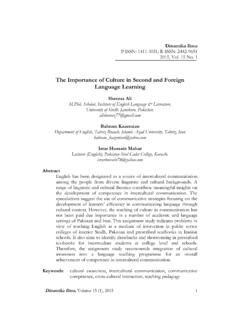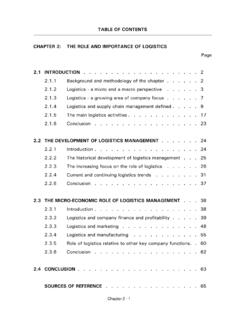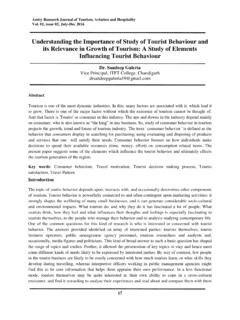Transcription of The Role of Evaluation at the Stages of Policy Formulation,
1 the role OF Evaluation AT THE Stages OF Policy FORMULATION, IMPLEMENTATION, AND IMPACT ASSESSMENT ANISUR RAHMAN KHAN AND MD. MIZANUR RAHMAN Abstract: Public Policy Evaluation is a sine qua non and unavoidable exercise for any nation states in the world. This paper discusses three major Stages of Policy Evaluation Evaluation at the formulation, implementation and post-implementation or impact assessment. In every stage Evaluation must follow appropriate standard and criteria. For the sake of greater public interest and maintaining real worth or value for money, subjectivity should be avoided in doing Evaluation studies rather proper objectivity should be maintained through choosing of right professionals or experts for doing right Evaluation .
2 In doing Evaluation , evaluators should try to choose proper sampling, produce unbiased interpretation and analysis, and maintain reliability and validity with ethical manners. The evaluator or decision-makers should never hide and distort the research findings and the competent authority should ventilate the findings and try to utilize the results and recommendations with no time. Keywords: Evaluation , Policy implementation, Policy formulation, impact assessment, Evaluation standard INTRODUCTION Public Policy Evaluation is a tool for measuring the worthiness, performance and efficacy of any Policy or program. In fact, Policy process or cycle starts with problem identification/agenda setting and moves through Policy formulation, Policy adoption, Policy implementation, Policy analysis or Evaluation and the last stage is Anisur Rahman Khan () Department of Social Relations, East West University, Dhaka, Bangladesh e-mail: Md.
3 Mizanur Rahman () Bangladesh Academy for Rural Development (BARD), Kotbari, Comilla, Bangladesh e-mail: AGATHOS, Volume 8, Issue 1 (14): 173-186 CC BY NC 2017 Anisur Rahman Khan and Md. Mizanur Rahman 174 Policy change, improvement or termination. Policy analysts opine that Evaluation can be taken in pre- Policy stage, formulation stage, implementation and post implementation or Evaluation stage. In simple sense, Policy Evaluation can be undertaken before implementation, during implementation and after implementation of any Policy or program. In other words, when we take new initiatives or any developmental undertaking we usually do feasibility study or need assessment, or in some cases it can be bench mark survey or this pre- Policy phase we can tell that it is formulation stage in the sense of Evaluation .
4 After the Policy or program is in operation, if Evaluation is undertaken during this time it will be implantation Evaluation and after implementation if we undertake Evaluation it will be Policy Evaluation or impact assessment or outcome Evaluation . The objective of this paper is to assess the role of Evaluation in Policy formulation stage, implementation stage and post implementation or impact assessment stage. In so doing, a thorough review of literature and researchers own reflexivity have been utilized. The prime motivation of this assessment is to fill-in the dearth of understanding how Evaluation is encompassed in some of the important Stages of Policy cycle and provides some guidelines how successful Evaluation is to be conducted.
5 CONCEPTUAL UNDERSTANDING OF Policy Evaluation In the simplest sense, Policy Evaluation is concerned with learning about the consequences of public Policy . The central tenet of the Policy Evaluation research is its focus on the activities of the public sector and its influence on society (Lester and Stewart, 2000). Policy Evaluation is the assessment of the overall effectiveness of a national program or Policy in meeting its objectives, or an assessment of the relative effectiveness of two or more programs in meeting common objectives (Wholey, John, Hugh, James, and Leona, 1970). Policy evaluations are concerned with the ability of the Policy to improve some societal conditions such as by reducing environmental pollution or by reducing crime (Lester and Stewart, 2000).
6 Gerston (1997) defines, Policy Evaluation assesses the effectiveness of a public Policy in term of its perceived intentions and results . Evaluation in the field of public Policy may be defined as an analytical tool and procedure meant to do two things. First, Evaluation research, an as analytical tool, involves investigating a Policy program to obtain all information pertinent to the assessment of its performance, both process and result; second, the role OF Evaluation AT THE Stages OF Policy FORMULATION 175 Evaluation as a phase of the Policy cycle more generally refers to the reporting of such information back to the Policy -making process (Wollmann, 2003 quoted in Fischer, Miller, and Sidney, 2007). Evaluation is the process of determining the merit, worth, and value of things (Scriven, 1991).
7 Evaluation is a key analytical procedure in any disciplined intellectual and practical endeavour. Evaluation implies looking backward in order to better steer forward. It is a mechanism for monitoring, systematizing, and grading government activities and their result so that public officials in their future-oriented work will be able to act as responsibly, creatively and efficiently as possible (Vedung, 2005). Policy Evaluation refers to the systematic assessment of the operation and/or the outcome of a program or Policy , compared to a set of explicit or implicit standard, as a means of contributing to the improvement of the program or Policy (Weiss, 1998). DIFFERENT Stages OF Policy Evaluation According to Rossi, Freeman, and Lipsey (1998), there are five Stages of program Evaluation such as; need assessment, assessment of program theory, assessment of program process or implementation Evaluation , impact assessment or Policy Evaluation and efficiency assessment.
8 Amongst the five Stages , evaluating the three Stages such as; formulation, implementation and impact assessment are so important since appropriate guidelines coming from these Stages would determine better outcome with regard to successful accomplishment of any public Policy . As such, three relevant Stages concerning Evaluation have been discussed beneath. ASSESSMENT OF PROGRAM THEORY OR Evaluation OF FORMULATION STAGE In a new program scenario, need assessment feeds into the development of the intervention program premised on specific program theory. However, assessment of the program theory is critical because some Policy implementation fails as a result of wrong theory/logic upon which the program was built (Pressman and Wildavsky, 1973).
9 It is also emphasized that if the program theory is faulty, the program is ultimately to fail anyway (Rossi, Freeman, and Lipsey, 1998). This can be in the form of inadequate focus and unrealistic assumptions guiding the formulation of the program. Assumptions and expectations give guidance on how the program is to be implemented in order to achieve the program goals and objectives; Anisur Rahman Khan and Md. Mizanur Rahman 176 and facilitate the conduct of other types of Evaluation . Hence, the assessment of the program theory is conducted in order to update, simplify, clarify and make more accessible the underlying theory of program. This type of Evaluation was firstly referred to as evaluability assessment in 1970 s and changed to assessment of program theory in 1980 s and in other literature it is currently being called assessment of program logic since 1990 s (Hurworth, 2008).
10 This method involves documentation of the assumptions implicit in program design and an indication of the data required to test these assumptions. In this respect, concepts such as realism, coherence, and relevance are evaluated. This involves the re-construction of underlying theory and the assessment of its constituent parts as well as their mutual connections. Subsequently, a program theory Evaluation may proceed to empirically; theoretically or logically test such assumptions and steps implied in the program logic (Hurworth, 2008). The process also identifies links between planned activities and anticipated outcomes (Hurworth, 2008). According to Chen, H. T. (1990) program theory is a set of interrelated assumptions, principles and/or propositions to explain or guide social actions.
